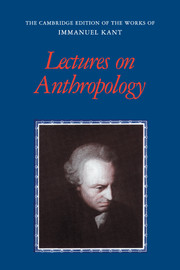Book contents
- Frontmatter
- Contents
- General editors’ preface
- Preface
- Abbreviations
- General introduction
- Anthropology Collins 1772–1773
- Translator's introduction
- Lecture of the Winter Semester 1772–1773 based on the transcription Collins, Philippi, Hamilton, Brauer, Dohna, Parow, and Euchel
- Anthropology Parow 1772–1773
- Anthropology Friedländer 1775–1776
- Anthropology Pillau 1777–1778
- Menschenkunde (1781–1782?)
- Anthropology Mrongovius (1784–1785)
- Anthropology Busolt, 1788–1789
- Editorial notes
- Glossary
- Bibliography
- Index
Translator's introduction
Published online by Cambridge University Press: 05 April 2013
- Frontmatter
- Contents
- General editors’ preface
- Preface
- Abbreviations
- General introduction
- Anthropology Collins 1772–1773
- Translator's introduction
- Lecture of the Winter Semester 1772–1773 based on the transcription Collins, Philippi, Hamilton, Brauer, Dohna, Parow, and Euchel
- Anthropology Parow 1772–1773
- Anthropology Friedländer 1775–1776
- Anthropology Pillau 1777–1778
- Menschenkunde (1781–1782?)
- Anthropology Mrongovius (1784–1785)
- Anthropology Busolt, 1788–1789
- Editorial notes
- Glossary
- Bibliography
- Index
Summary
Kant began lecturing on Anthropology in the winter of 1772–1773. The earliest transcriptions of these lectures that have come down to us are the Collins text and the Parow text. Both are evidently lectures on Baumgarten's empirical psychology; and both texts are fairly extensive: Collins is nearly 240 printed pages. It is a compilation from notes taken by seven transcribers. After a brief “Prolegomena” and introductory “Treatise,” it begins by treating the human understanding, or faculty of theoretical cognition, followed by discussions of special talents and diseases of the mind, then passes on to a treatment of the faculty of taste, and ends with a discussion of the faculty of desire, including a treatment of affects and passions, and of human character.
The selections translated here include the opening Prolegomena and Treatise, which discuss the aims and method of anthropology, a selection from Kant's discussion of taste, and a very brief excerpt presenting Kant's conception of character, as it appears in his earliest lectures.
- Type
- Chapter
- Information
- Lectures on Anthropology , pp. 13 - 14Publisher: Cambridge University PressPrint publication year: 2012

